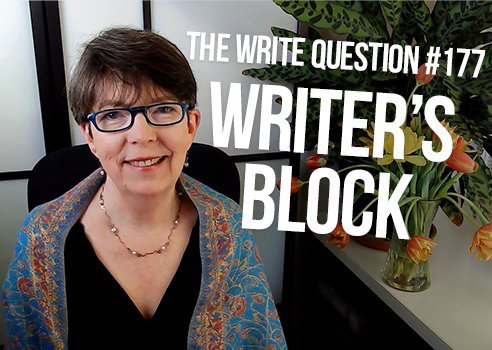Viewing time: 5 mins 13 secs
The Write Question is a weekly video podcast about writing that I started in 2017 and that ran, more or less weekly, until April 2022. This is a republication of issue #177, which addresses how to deal with a writing block. The post first ran on March 5/21.
Transcript:
How can you deal with a writing block? That’s the topic I’m addressing today in The Write Question. I’m Daphne Gray-Grant, the Publication Coach, still in pandemic mode.
I have a question from Elizabeth Williams, a writer based in Amarillo, Texas. Here’s what she’s asked by email….
“I’m working on my dissertation, and I’m having a hard time staying interested in writing. The topic feels too big and overwhelming to me and every time I sit down at my keyboard I feel completely overwhelmed. I’m a scientist, not a writer, so I have a hard time applying the phrase “writer’s block” to my problem. But, I figure I have some sort of writing block. Can you help me?”
Thanks for your question, Elizabeth. I’m glad you’re skeptical about using the excuse of writer’s block. Whenever I hear that expression I’m reminded of a quote from writer Terry Pratchett who said, “There’s no such thing as writer’s block. That was invented by people in California who couldn’t write.”
Nevertheless, I’ve worked with thousands of writers over the last 40 years — many of them academics — and I can make some educated guesses about the nature of your block.
Here are the top five writing blocks facing many academics:
- They aren’t thinking enough about what they want to say in advance. Many years ago, I heard a nutritionist say that the problem with vegetarians is that many of them don’t eat nearly enough vegetables. The irony of that statement is amusing, and I think a similar comment can be made about academics. The big problem is that many of them don’t think nearly enough. It should be obvious that thinking is a major part of the job for an academic. But this thinking requires time and space. You can’t do it while you’re teaching or grading papers or speaking with your dean. And you shouldn’t try to do it while you’re sitting at your desk. Go for a walk and think. Really think. You need ideas to be able to write. Don’t start writing until you have some.
- They are editing WHILE they write. The editing brain is highly critical, and the writing brain is highly sensitive. If you try to write with your editing brain engaged, all you’re going to do is criticize yourself, and that will make you miserable. Editing is essential, but only after you’ve written a first draft. I’ve helped many people shut down the bad habit of trying to do both jobs at once, and I give a link about how to do that in the show notes below.
- They are researching WHILE they write. I’ve known many academics who keep their noses in books or on the pages of peer-reviewed journal articles while they are trying to write. They don’t seem to understand that this is a confusing and painfully slow way to work. Break this habit as well. To help you do this, I suggest you keep a research diary. See link in the show notes below.
- They are trying to write a brilliant first draft. Many non-professionals fail to understand that no experienced writer expects a first draft to be any good at all. Understand that the best time to improve your work is when you are editing it, after writing. Content yourself with what I like to call a crappy first draft. See the link in the show notes below.
- They are spending too MUCH TIME trying to write. Many academics tell me they want or need to write for four hours a day. This is craziness! Instead, give yourself much smaller and more reasonable goals. And build up to them gradually. Most people find researching interesting and non-threatening, so perhaps you could spend an hour a day doing that. But in terms of writing, start with no more than 15 minutes and build yourself up gradually. If you start small, you’re far more likely to succeed and far less likely to procrastinate.
Writing a dissertation is a big deal, but it’s not an insurmountable one. Take it one word at a time and do the best you can.
Finally, let me wrap up with a quote from the American writer Barbara Kingsolver: “I learned to produce whether I wanted to or not. It would be easy to say oh, I have writer’s block, oh, I have to wait for my muse. I don’t. Chain that muse to your desk and get the job done.”
Elizabeth, the big issue with academic writing is that the academy provides very little instruction on it. Scale back your goals, stop trying to write the best dissertation in history — as Barbara Kingsolver says — just get the job done.
*
If you’d like to learn more about how to make writing a happier and more rewarding process, check out my latest book Your Happy First Draft. I don’t sell it in bookstores or via Amazon. The only place to buy it is on my website, link on the screen below and in the show notes.


